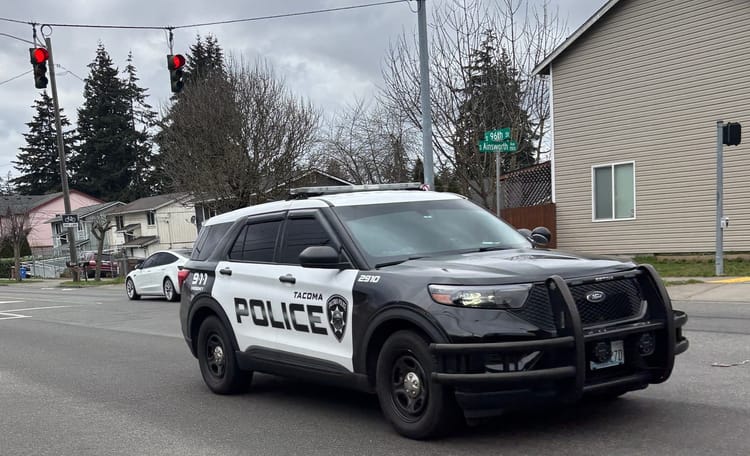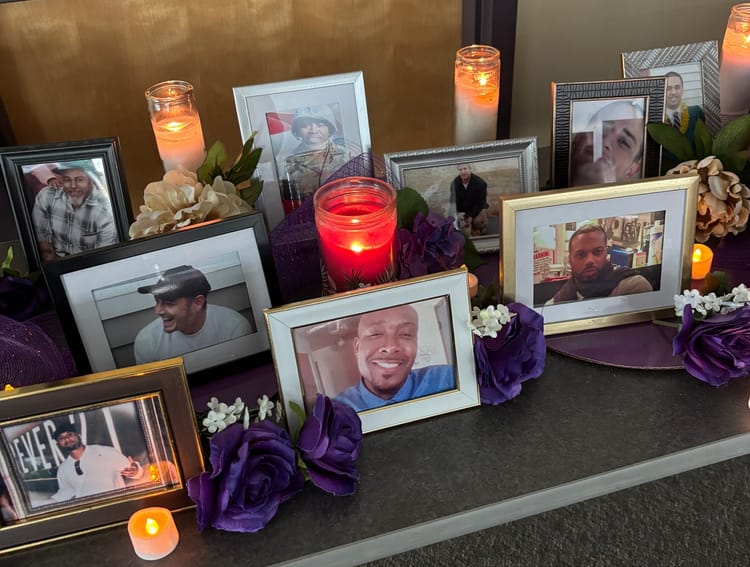Olympia settles fatal police shooting of Timothy Green for $600K—with key strings attached

Last week, the city of Olympia and the family of Timothy Green reached a $600,000 settlement, a day after the two-year anniversary of Green's killing by city police. The settlement includes a new policy against police personalizing department equipment and mandated training for racial bias and crisis intervention. It's not a huge dollar figure, but it's a pretty big deal when you consider the relative number of training hours and how much cops LOVE to customize their stuff, particularly with The Punisher logos and Ferguson protest-inspired "thin blue line" flags.
The Green family's attention is now on higher levels of government. They've said they asked Thurston County Prosecuting Attorney Jon Tunheim to reopen the criminal investigation into Green's killing in light of the murder conviction of Auburn police officer Jeff Nelson in the killing of Jesse Sarey. Outside prosecutors from Clark County reviewed the investigation conducted by uninvolved regional law enforcement and determined the shooting was lawful in December, so Tunheim didn't file charges. They also submitted complaints with the state Criminal Justice Training Commission seeking to revoke their certifications to work as police. Both decertification and a criminal case would take years.
Before the settlement, Green's family was negotiating a $21 million tort claim with the city and had not filed a lawsuit. The settlement will benefit Green's two children, who were 12 and 16 at the time of his death.
Settlement Details
- Policy Prohibiting Personalized Equipment: The OPD will adopt a policy prohibiting employees from personalizing department equipment.
- Training on Racial Bias and Crisis Intervention: Olympia Police Chief Rich Allen, his deputy chiefs, and the officers involved in the shooting will be required to complete Criminal Justice Training Commission training on racial bias and the historical intersection between race and policing within one year. All patrol officers will be required to take a 40-hour crisis intervention course within two years. All patrol officers will also take an additional eight-hour crisis intervention use of force options class within two years.
Context
Four Olympia officers confronted Timothy Green, a 37-year-old black man with known mental health issues, in a parking lot without the help of mental health specialists on Aug. 22, 2022. In written statements weeks after the shooting, three of the officers said they didn't discuss calling unarmed crisis responders because Green was "violent" and "threatening." The officers also said Green had a pocket knife in his hand.
Witnesses said Green went up to two cars in the drive-through. The first rolled down the window to tell Green to put the knife away. The second said Green looked harmless. When the police yelled at Green to stop, he put his soft-cover Bible against his head with one hand and held his small wooden knife in the other.
After the officers' attempt to surround Green and fire two tasers to restrain him failed, Green ran, officer Jordan Anderson blocked his path to flee, then shot and killed him. The acting supervisor at the scene was supposed to cover the other three officers using a beanbag shotgun. Anderson declined to submit a written statement after the shooting. It's unclear if he's spoken to Olympia detectives for the internal investigation.
Two days before his killing, on August 20, 2022, Green's parents called 911 to report that Green had barricaded their front door and “made threats to kill himself and everything around him." His parents informed the responding officers that Green was bipolar, schizophrenic, and had been using drugs and hallucinating. They also said Green was known to local police and unlikely to be hostile. It was Bellamy and Anderson who, along with a third officer, convinced Green to leave “without incident.”
Green's family noted in an announcement that Anderson, according to scene photos, wore gloves decorated with a thin blue line, which is associated with the anti-Black Lives Matter movement, Blue Lives Matter. Investigative photos also show the acting supervisor at the scene, Joseph Bellamy, also had a combination thin blue and red line patch on his department laptop, as well as an anti-government-associated, meme-ified, "Don't Tread on Me" patch and a literal shit magnet.
Prior to the shooting, training records show Anderson and Bellamy had last received crisis intervention training more than 18 months earlier. A new officer, Caleb Shaffer, had never been trained. A more senior officer who retired after the shooting hadn't received the training since 2020. Not unsurprisingly, none of the officers had taken the Criminal Justice Training Commission's new-at-the-time class on racial bias.
In 2022, the OPD Police Auditor found that an overwhelming amount of use of force incidents (about 72%) involved people who were suffering from mental health issues and/or severely impaired by drugs or alcohol. Officers often reported that their de-escalation techniques didn't work in those situations.
The auditor also determined that eight of 68 use of force incidents (about 11%) involved Black people, despite only 3% of residents being Black.
If you're interested in reading yourself, here's the case file and let me know what you think. Please don't share the link until I've put it in the regular newsletter :)
Green's family and advocates have also heavily criticized the Olympia Police Department for publishing incorrect information on Twitter about the involved officers being treated for injuries at the scene after Green "attacked" them, when none of the officers received care. In recent years, many departments have defaulted to releasing less information, more slowly, in the aftermath of shootings and other deaths in custody. Spokespeople often attribute this to reform laws and public outcry against police publicly releasing details that tend to defame the dead.





Member discussion